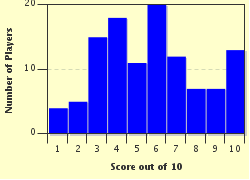Quiz Answer Key and Fun Facts
1. Let's start in the beginning. According to the first chapter of Genesis, "He [God] made the stars also." However, do you know which day He made them?
2. In Genesis 15, to which Patriarch was the Lord speaking when He promised the following: "Look now toward heaven, and count the stars if you are able to number them . . . So shall your descendants be"?
3. In Job, Chapter 9, Job himself speaks while attempting to argue how powerful God is. At one point, Job explains that God made the well-known cluster of stars referred to as the Pleiades as well as two highly recognizable constellations. Which two constellations does Job mention?
4. The writer of Psalm 8 is amazed that God pays attention to human beings at all when he looks upon "the moon and the stars." He is in awe of the fact that all of the "heavens" are the work of God's what?
5. In one of the many visions (remember the wheels?) experienced by this prophet, God speaks the following words about the destruction of Egypt: "I will also water the land with the flow of your blood, / Even to the mountains; / And the riverbeds will be full of you. / When I put out your light, / I will cover the heavens, and make its stars dark; / I will cover the sun with a cloud, / And the moon shall not give her light." Which prophet, referred to by God as "son of man," received this vision?
6. Daniel, another Old Testament prophet, foresees that many of his people who have died would be resurrected from "the dust of the earth." Then, he explains (or at least God explains through Daniel) that "Those who are wise shall shine / Like the brightness of the firmament, / And those who turn many to righteousness / Like the stars forever and ever." However, Daniel does not share the names of those who shall be given "everlasting life." Why?
7. According to Obadiah, verse 4, prideful people are like which bird that builds its "nest among the stars" (New King James Version)?
8. Which of the four New Testament gospels is the only book in which one may read a verse like this one? "Where is He who has been born King of the Jews? For we have seen His star in the East and have come to worship Him."
9. In Revelation 8:10, John writes, "Then the third angel sounded: And a great star fell from heaven, burning like a torch, and it fell on a third of the rivers and on the springs of water." Verse 11 explains that this falling star made the water "bitter," "and many men died from the water." What does John say is the name of this star?
10. In Revelation 22:16, who is referred to as "the Bright and Morning Star"?
Source: Author
alaspooryoric
This quiz was reviewed by FunTrivia editor
CellarDoor before going online.
Any errors found in FunTrivia content are routinely corrected through our feedback system.

